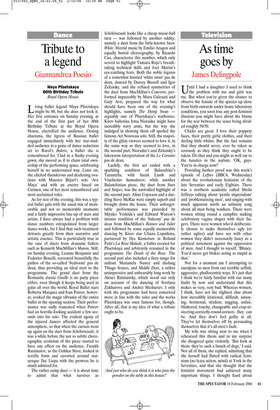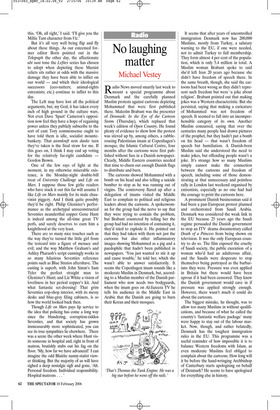As time goes by
James Delingpole
Until I had a daughter I used to think the problem with me and girls was me. But when you’re given the chance to observe the female of the species up close from birth onwards under home laboratory conditions, you soon lose any post-feminist illusions you might have about the blame for the war between the sexes being divided roughly 50/50.
Chicks are great. I love their poppety faces, their pretty girlie clothes, and their darling little whims. But the fact remains that they should never, ever be taken as seriously as they think they ought to be taken. Do that and you might as well say to the lunatics in the asylum, ‘OK, guys. You’re in charge now!’ Providing further proof was this week’s episode of Lefties (BBC4, Wednesday) about the revolutionary feminists of the late Seventies and early Eighties. There was a northern academic called Sheila Jeffreys talking about ‘penile imperialism’ and ‘problematising men’, and singing with much apparent mirth an unfunny song about all men being wankers. There were women sitting round a campfire making celebratory vagina shapes with their fingers. There were women who’d deliberately chosen to make themselves ugly (or rather uglier) and have sex with other women they didn’t necessarily fancy as a political statement against the oppression of men. And I thought to myself, ‘Blimey. You’d never get blokes acting as stupid as that.’ Not for a moment am I attempting to exculpate us men from our terrible selfish, aggressive, phallocentric ways. It’s just that I think we’re fairly familiar with our many faults by now and understand that this makes us very, very bad. Whereas women, I think, have not the slightest clue about how incredibly irrational, difficult, annoying, hormonal, strident, nagging, unfair, blinkered, touchy, changeable and crap-atsteering-correctly-round-corners they can be. And they don’t feel guilty at all. They’ve let themselves off by persuading themselves that it’s all men’s fault.
My wife was sitting next to me when I rehearsed this thesis and to my surprise she disagreed quite violently. ‘But look at them: they’re such a bunch of dogs,’ I said. Not all of them, she replied, admitting that she herself had flirted with radical feminism (no lezza action, mind) at York in the Seventies, and that she thought that the feminist movement had achieved many important things. I thought hard about this. ‘Oh, all right,’ I said. ‘I’ll give you the Millie Tant character from Yiz.’ But it’s all very well being flip and fly about these things. As our esteemed former editor Boris pointed out in the Telegraph the other day, the affectionate ubi sunt tone the Lefties series has chosen to adopt when depicting these Marxist relicts sits rather at odds with the massive damage they have been able to inflict on our world — and which their ideological successors (eco-nutters; animal-rights extremists; etc.) continue to inflict to this day.
The Left may have lost all the political arguments, but, my God, it has taken every inch of high ground in the culture wars. Not even Dave ‘Spart’ Cameron’s opposition now feel they have a hope of regaining power unless they publicly subscribe to the sort of cant Tory commonsense ought to have told them is idle, socialist mountebankery. That atomkraft nein danke turn they’ve taken is the final straw for me. If this goes on, I think I may end up voting for the relatively far-right candidate Gordon Brown.
One of the few rays of light at the moment, in my otherwise miserable existence, is the Monday-night double-bill treat of University Challenge and Life on Mars. I suppose those few girlie readers who have stuck it out this far will assume I like Life on Mars mainly for its male chauvinist piggery. And I think quite possibly they’d be right. Philip Glenister’s performance as the archetypal unreconstructed Seventies neanderthal copper Gene Hunt is indeed among the all-time great TV perfs, and surely deserves to earn him a knighthood at the very least.
There are so many nice touches such as the way they’ve turned the little girl from the testcard into a figure of menace and evil; and the way Matthew Graham’s and Ashley Pharaoh’s script cunningly works in so many hilarious Seventies reference points such as Blue Stratos aftershave. The casting is superb, with John Simm’s Sam Tyler the perfect straight man to Glenister’s Hunt; and Liz White a vision of loveliness in her period copper’s kit. And what fantastic set-dressing! That grim Seventies cop-shop interior, with its messy desks and blue-grey filing cabinets, is so how the world looked back then.
Though Life on Mars pays lip service to the idea that policing has come a long way since the blundering, corruption-ridden Seventies, and that society has grown immeasurably more sophisticated, you can see its true sympathies lie elsewhere. There was a scene the other week where Hunt visits someone in hospital and, right in front of matron, brutishly stubs out his fag on the floor. ‘My, how far we have advanced!’ I can imagine the odd Blairite nanny-statist viewer thinking. But the majority of us will have sighed a deep nostalgic sigh and gone, ‘Ah. Personal freedom. Individual responsibility. Hospital matrons.. . ’



















































































 Previous page
Previous page